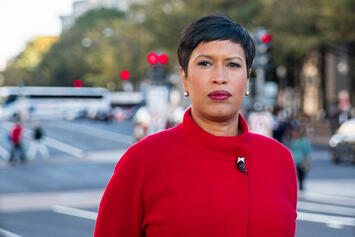
Washington, DC Mayor Muriel Bowser thinks people worldwide have a “human right” to come to the United States, legally or illegally. Our nation’s capital proudly proclaimed itself a “sanctuary city” in 2016. “We celebrate our diversity and respect all DC residents,” the mayor said, “no matter their immigration status.”
But when Arizona and Texas were overwhelmed by a million-plus illegal migrants – and their governors sent a couple thousand of them to Washington – she was outraged.
They have “overwhelmed” our public services, she complained. The sanctuary city faces “an emergency,” a “humanitarian crisis.” DC taxpayers “should not be picking up the tab” for housing and feeding these once-celebrated immigrants. We need National Guard troops to help cope, she pleaded – twice.
Her city of 707,000 people, 10,000 city government employees and a proposed FY2023 budget of $19.5 billion cannot cope with a few thousand migrants? But little border towns should happily accommodate the tsunami of illegals Mr. Biden has allowed to cross our southern border?
Chickens coming home to roost can be painful. But the real problem is the (willful) inability of progressive politicians and activists to foresee even easily foreseeable consequences of their decisions – and then demand that scapegoats pay to fix the problems the progressives caused.
The District of Columbia is about to inflict an enormous new set of roosting-chicken realities on its residents – and even more on its neighbors: Maryland, Virginia and West Virginia.
Led by Councilwoman Mary Cheh, DC’s City Council recently passed two laws banning fossil fuels for heating, cooking, and city-owned vehicles. Together, they position their city as a top virtue signaler on manmade climate change, which Ms. Cheh calls “the single most important environmental issue of our time.” Mayor Bowser enthusiastically endorsed the efforts.
The “Clean Energy DC Building Code Amendment Act” prohibits fossil fuels for home and water heating in new commercial buildings (including residential buildings four stories and higher), starting in 2027. It also requires that restaurants and families cook with electricity instead of natural gas. Only buildings deemed “essential to protecting public health and safety” may use gas for backup electricity generation.
The “Climate Commitment Act” forbids fossil fuel heat for new district-owned buildings, including schools, by 2025. It requires that all DC vehicles be “zero-emission” by 2026; all District operations be “carbon-free” by 2040; and the entire city be “carbon-neutral” by 2045.
Every successive fossil fuel reduction will require expanded electricity use – and generation. With DC-based nuclear almost certainly a nonstarter, power generation will presumably be via “renewable energy,” mostly wind and solar. But these technologies are intermittent, unreliable and weather-dependent. They must be backed up by batteries that must be recharged constantly, by more wind and solar power.
Let me say it yet again. Wind and sunshine are renewable and sustainable. However, the materials needed to harness this energy to power modern civilization absolutely are not. This DC Green New Deal alone would require millions of tons of metals, minerals, concrete and plastics; billions of tons of ores, and hundreds of new mines and factories – in the United States, China, Africa, Latin America and elsewhere.
With China, India and other countries burning more fossil fuels to improve people’s living standards – and supply all those “green energy” needs – global greenhouse gas emissions will continue rising. Even assuming fossil fuel emissions actually do drive climate change, DC’s “historic” laws might therefore reduce average global temperatures by 0.0002 degrees by 2100.
Washington already imports 100% of its electricity from neighboring states. So can virtue-signaling DC government officials answer just a few of many fundamental questions?
Read the rest of this piece at Eurasia Review.
Paul Driessen is a senior fellow with the Committee For A Constructive Tomorrow and Center for the Defense of Free Enterprise, nonprofit public policy institutes that focus on energy, the environment, economic development and international affairs.
Photo: Lorie Shaull, via Flickr> under CC 2.0 License.













Congress?
Pretty sure that Congress would have to approve this legislation. Which I very much doubt it will do.